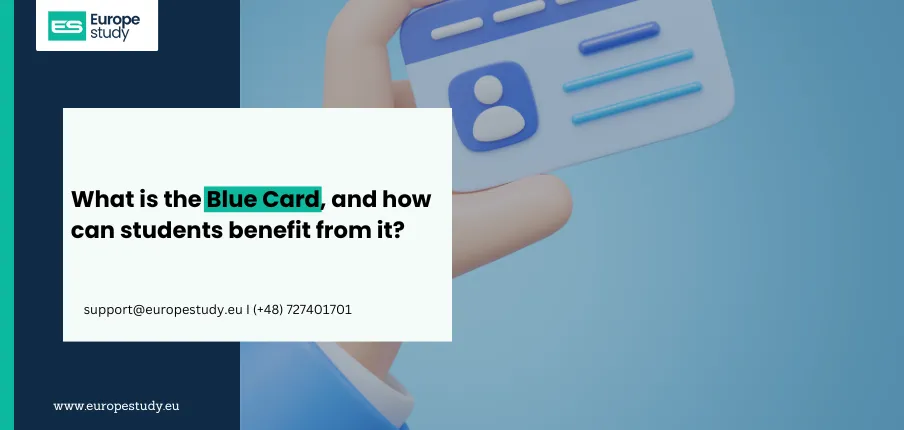
What is the Blue Card, and how can students benefit from it?
For many international students, studying in Germany is not just about education—it's about building a future in Europe. One of the most valuable tools for achieving that goal is the EU Blue Card. But what exactly is it, and how can students benefit from it after graduation?
This guide will walk you through everything you need to know about the EU Blue Card in Germany, especially if you’re an international student planning to stay and work after your studies.
What is the EU Blue Card?
The EU Blue Card is a residence and work permit for highly skilled non-EU nationals. It allows you to live and work in Germany (and some other EU countries) with the potential to eventually gain permanent residency.
It was introduced to attract qualified professionals to the European labor market and offers several benefits over regular work permits.
Key Benefits of the EU Blue Card
- Fast-tracked permanent residency: Eligible Blue Card holders can apply for permanent residence in as little as 33 months—or even 21 months with sufficient German language skills (B1).
- Family reunification: Your spouse and children can join you, and spouses are allowed to work without restrictions.
- Mobility within the EU: After 18 months, you may move to another EU country and apply for a new Blue Card there.
- High salary and job stability: The Blue Card is tied to a skilled job with a minimum salary, ensuring a strong entry into the workforce.
How Can International Students in Germany Benefit From It?
As a student in Germany, you're in a strong position to transition into the Blue Card system after graduation. Here’s how you can benefit:
1. Direct Transition After Graduation
After completing your degree in Germany, you can:
- Apply for a Job-Seeker Visa (valid for up to 18 months) to find a qualified job.
- Once employed in a job that matches your qualifications and meets the salary threshold, you can apply for the EU Blue Card.
2. Lower Salary Threshold for Graduates
If you studied in Germany, you're often subject to a lower salary threshold compared to applicants from outside the country. As of 2024:
- Standard minimum salary: approximately €45,300/year
- Shortage occupations (e.g., IT, engineering, healthcare): approximately €41,041/year
These thresholds are adjusted yearly, so always check the latest figures.
3. Faster Integration and Recognition
Because you obtained your degree in Germany, your qualifications are automatically recognized. That means no delays in the approval process due to foreign degree evaluations.
Eligibility Requirements for the EU Blue Card in Germany
To apply, you must:
- Hold a recognized university degree.
- Have a binding job offer or employment contract in Germany.
- The job must be relevant to your qualifications.
- The gross annual salary must meet or exceed the required threshold.
- For regulated professions (doctors, lawyers, etc.), recognition of your qualification may be required.
Application Process
- Get a job offer in Germany that meets the salary threshold.
- Prepare documents:
- Passport
- University degree
- Employment contract
- Proof of salary
- Passport photo
- Completed Blue Card application form
- Book an appointment at your local Foreigners’ Office (Ausländerbehörde).
- Submit the application and wait for approval (processing can take a few weeks).
- Once approved, you’ll receive a residence permit in card format valid for up to 4 years (renewable).
Tips for Students Planning Ahead
- Learn German early: B1 proficiency speeds up your path to permanent residency.
- Start job hunting before graduation: Use university career services and platforms like LinkedIn, StepStone, and Indeed.
- Consider shortage occupations: These fields have lower salary thresholds and high demand.
- Track your timeline: Know when your student residence permit expires and plan the transition.
Conclusion: A Launchpad to a Career in Europe
The EU Blue Card is more than just a visa—it’s a pathway to long-term residence, job security, and a future in Europe. For international students who have invested time and energy in earning a degree in Germany, it’s a logical and powerful next step.
If you're planning to stay in Germany after your studies, the EU Blue Card is a door worth opening.





